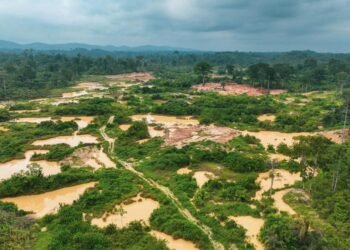Dr Yusif Sulemana, an Energy Consultant and Senior Oil Production Specialist at Petroleum Development of Oman, has intimated that receiving freebies (in the form of carbon charges) just to keep the country’s hydrocarbon resources in the ground will not inure to the benefit of the country.
This comes at a time when the World Bank has recommended to the government of Ghana, in a recent report, to consider adopting the use of carbon charges to expand and diversify fiscal revenues, while also meeting its climate commitments and generating climate co-benefits.
Ghana’s post-Covid recovery has been characterized with escalating debt levels, and growing public spending needs, albeit, the country’s revenue mobilization efforts has been abysmal. Ghana’s tax-to-GDP ratio falls below the SSA’s average of 15.6%, currently hovering around 14%.
This form of environmental taxation espoused by the World Bank, mimics a “low hanging fruit” but the potential negative impact of imposing carbon taxes will be grossly disproportionate to the gain likely to be derived from it, Dr Sulemana said.
“The broader issue is this carbon tax phenomenon. Even in the advanced world they are struggling to implement this carbon tax. It is a complex mechanism and if it comes to our part of the world, we are going to give out carbon credit… That means they [IOCs] are going to pay us [when they emit beyond a cap] but that is even a disincentive. We don’t want people to pay us to keep our resources in the ground.”
Dr Yusif Sulemana, Energy Consultant
Africa as a continent must not become “recipients of freebies just to keep our resources that will inure to our benefits in the ground just like coal is still relevant after more than a century of use and up till now even the advanced world do not want to [leave coal in the ground].”
He stressed that “we might be forced” to keep these resources that have great potential to benefit the country in the ground, “that’s how come we have to strategise… in the sense that when the going becomes tough, we can depend on our internal capabilities.”
Carbon Incomes Likely to End Up in “wrong” Pockets
Nico, Van Staalduinen, Honorary Consul at the Consulate General for The Republic of Bulgaria to The Republic of Ghana is cited to have said that there are high risks for incomes from carbon taxes to be wrongfully spent or end up in the “wrong” pockets.
“Africa should continue using its carbon areas to develop as soon as possible before the rich/developed world put measures on it to force us to stop. Inter Africa trade should be developed as soon as possible so the developed world can’t ransom Africa.
“They created the climate mess, they are responsible for cleaning it up. President Bush once stated that the USA couldn’t sign up to the Kyoto protocol because the USA, the richest country in the world was in economic distress. What about Africa?
“We have been in economic distress for the last 50 years, don’t you think that’s a good reason to say? Solve your own problems.
“We will take care of our undisturbed development, just like you did between 1945 and 2000.”
Nico, Van Staalduinen, Honorary Consul at the Consulate General for The Republic of Bulgaria to The Republic of Ghana
In the coming years, it will not be surprising to see advanced economies begin to foist carbon taxes around the necks of developing economies as it appears to be raising its head currently.
The government must adopt strategies by which it could sufficiently develop its hydrocarbon resources, despite the growing pressures, in order to grow its economy.
READ ALSO: Ghana: Unsafe and Dangerous Working Conditions, Major Concern for Gig Economy Workers






















